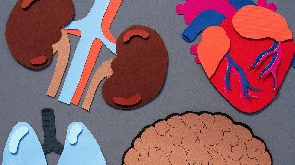Scientists believe say dem fit run blood test to check how fast pesin internal organs dey age, and even predict which ones fit fail soon.
Di Stanford University team tok say dem fit monitor 11 major body parts, wey include di heart, brain and lungs.
Dem try am on thousands of adults, most of dem dey middle-aged or older.
One inside five reasonably healthy adults wey dey di age of 50-plus fit get at least one organ wey dey age fast, di results suggest.
While di idea of check-up fit dey scary, e fit be opportunity to intervene and change course, di researchers tok.
To know which organs dey fail fit help reveal which health issues pesin fit face, di researchers tok for di journal Nature.
Organ age gap
For di study, to get one or more organs wey dey age fast dey linked wit a higher risk of certain diseases and death over di next 15 years.Di body parts dem check include:
- Brain
- Heart
- Liver
- Lung
- Intestine
- Kidney
- Fat
- Blood vessels (arteries)
- Immune tissue
- Muscle
- Pancreas
Di pattern of proteins dem detect appear to dey specific to particular organs.
Researchers bin train one machine-learning algorithm to make di predictions wit di use of plenty blood test results and patient data.
One of di investigators, Dr Tony Wyss-Coray, explain say: "Wen we compare each of dis organs biological age for each individual wit dia counterparts among a large group of pipo wey no get obvious severe diseases, we see say 18.4% of dose wey be 50 or older get at least one organ wey dey age fast pass di average.
"And we see say dis individuals dey at high risk for disease for dat particular organ for di next 15 years."
Di university now don submit di paperwork to patent di test, in case dem wan use and sell am for future.
More studies dey needed to check how good e really dey at predicting organ age and health.
Some of Dr Wyss-Coray earlier work suggest say di biological ageing process no dey steady but e dey come in bursts, wit some rapid accelerations for pipo wey dey dia mid-30s, early-60s and late-70s.
Prof James Timmons, one expert for age-related health and diseases for Queen Mary University of London, don also dey study blood markers of biological age.
Im work dey focus on visible gene changes, rather dan proteins.
E say di latest findings by Dr Wyss-Coray dey impressive, but e need carry out di test on more pipo, particularly younger ones from diverse ethnic backgrounds.
Dr Wyss-Coray tok say: "If we fit reproduce dis finding for inside 50,000 or 100,000 pipo e go mean say by monitoring di health of individual organs for healthy pipo body, we fit find organs wey dey go accelerated ageing for pipo bodies, and we go fit treat pipo before dem get sick."
Prof Paul Sheils, expert for biology of ageing for Glasgow University, tok say e still dey important to look di whole body, not just individual organs, to build di most accurate picture of pesin health.
















